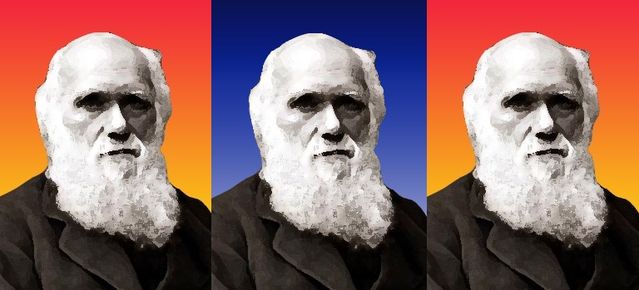Ethics and Morality
Could Morality Have a Transcendent Evolved Purpose?
Religions say morality is transcendent—what does evolutionary theory say?
Posted December 6, 2017

As part of an academic project, I've been asked to respond to the question “Is there a universal morality?” I've decided to interpret this question in both a conventional and unconventional manner.
First, briefly, a more conventional response (conventional from the perspective of behavioral biology, anyway) would be “yes and no.” Because there is an evolved human nature, the same behavioral patterns tend to crop up repeatedly across cultures (not to mention across species). These include behaviors we’d categorize as "moral", such as reciprocal altruism, free-rider punishment, kin altruism, incest avoidance, and cooperative signaling. Even though these behaviors can be considered universal, however, the psychological adaptations that regulate them may be facultatively evoked and prioritized in some environments more than others. We therefore observe cross-cultural variation in the extent to which these behaviors are expressed. For instance, although all cultures have some restrictions on the permissibility of sex between genetic kin [1], some cultures regard sex between first cousins as taboo while others encourage it. Another example is cooperative signaling [2]: although the signaling of moral virtue and cooperative disposition appears to be a universal behavior, there is cultural diversity in the specific signals used (e.g., whether abstinence from a particular food is regarded as virtuous or not).
Now for a more unconventional interpretation. Could morality be "universal" in the sense that there is some transcendent moral purpose to human existence itself? The conventional interpretation offered above assumes that morality emanates ultimately from human nature, which itself evolved ultimately to enable genetic survival and reproduction. But could morality have some larger purpose, that transcends and subsumes biologically-evolved human interests?
This is a tricky question because natural selection is the only process known to science that can ultimately engineer "purpose" (moral or otherwise). It does so by generating "function," which is essentially synonymous with "purpose": the function/purpose of an eye, for example, is to see. And if selection is the only natural source of purpose, it is hard to see how morality could ultimately serve any larger kind of purpose. Conventional religions sidestep this problem, of course, by positing a supernatural purpose provider. But that’s an unsatisfactory solution, if you wish to maintain a naturalistic worldview.
To most people with a naturalistic worldview, the issue ends here. There can be no transcendent purpose, because no widely-understood natural process can generate such purpose. Transcendent purpose is a subject for religion, and maybe for philosophy, but not for science. That’s the standard naturalistic conclusion.
I think the standard naturalistic conclusion is premature, however. There is one way in which transcendent naturalistic purpose could in fact exist.
If selection is the only natural source of purpose, then transcendent moral purpose could exist if selection were operating at some level more fundamental than the biological. Specifically, transcendent purpose would require a process of cosmological natural selection, with universes being selected from a multiverse based on their reproductive ability, and intelligence emerging (as a subroutine of cosmological evolution) as a higher-level adaptation for universe reproduction. From this perspective, intelligent life (including its moral systems) would have a transcendent purpose: to eventually develop the sociopolitical and technical expertise that would enable it to cooperatively create new universes. This creation process would enable universe reproduction, because these new universes would need to be governed by the same physical laws and parameters as the original universe, in order for intelligent life to be able to exist in them.
Importantly, this idea of "cosmological natural selection with intelligence" [3-8] does not dispute that morality is ultimately explicable in terms of biological (including biocultural) evolution alone. It suggests, rather, that biological/biocultural evolution is itself a subroutine of a larger evolutionary process.
These ideas are highly speculative and may seem strange, especially if you haven’t heard them before. But notions of cosmological natural selection, and of life as a mechanism of universe reproduction, are not so new or radical. They have been under development for decades now [3-11], and are reasonably consilient with existing bodies of scientific knowledge.
At any rate, my goal here is not to argue that these ideas are likely to be true, nor that they are likely to be false. I simply want to point out that if they're false, then it seems like it must also be false – from a naturalistic perspective, at least – that morality could have any transcendent purpose.
A version of this article will be published in This View of Life.
References
1. Lieberman, D., Tooby, J., & Cosmides, L. (2007). The architecture of human kin detection. Nature 445: 727-731.
2. Bulbulia, J., & Sosis, R. (2011). Signalling theory and the evolution of religious cooperation. Religion 41: 363-388.
3. Crane, L. (1994/2010). Possible implications of the quantum theory of gravity: an introduction to the meduso-anthropic principle. arXiv:hep-th/9402104v1. Reprinted in Crane, L. (2010). Foundations of Science 15: 369-373.
4. Gardner, J. N. (2000). The selfish biocosm. Complexity 5: 34-45.
5. Smart, J. M. (2009). Evo devo universe? A framework for speculations on cosmic culture. In Cosmos and Culture: Cultural Evolution in a Cosmic Context, S. J. Dick and M. L. Lupisella, Eds., pp. 201–295, Government Printing Office, NASA SP-2009-4802, Washington, DC.
6. Vidal, C. (2014). The Beginning and the End: The Meaning of Life in a Cosmological Perspective. Springer.
7. Price, M. E. (2017). Entropy and selection: Life as an adaptation for universe replication. Complexity, vol. 2017, Article ID 4745379, 4 pages, 2017. doi:10.1155/2017/4745379
8. Price, M.E. (Forthcoming). Cosmological natural selection and the function of life. In Evolution, Development and Complexity: Multiscale Evolutionary Models of Complex Adaptive Systems, edited by G. Georgiev, C. L. F. Martinez, M. E. Price, & J. Smart. Springer.
9. Smolin, L. (1992). Did the universe evolve? Classical and Quantum Gravity 9: 173–191.
10. Smolin, L. (1997). The Life of the Cosmos. New York: Oxford University Press.
11. Gardner, A. & Conlon, J. P. (2013). Cosmological natural selection and the purpose of the universe. Complexity 18: 48–56.


